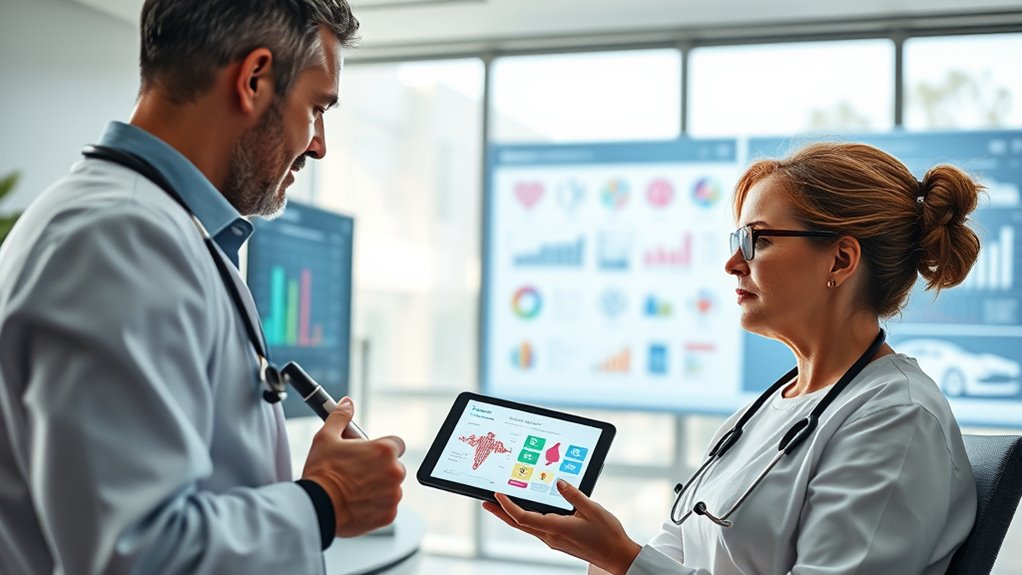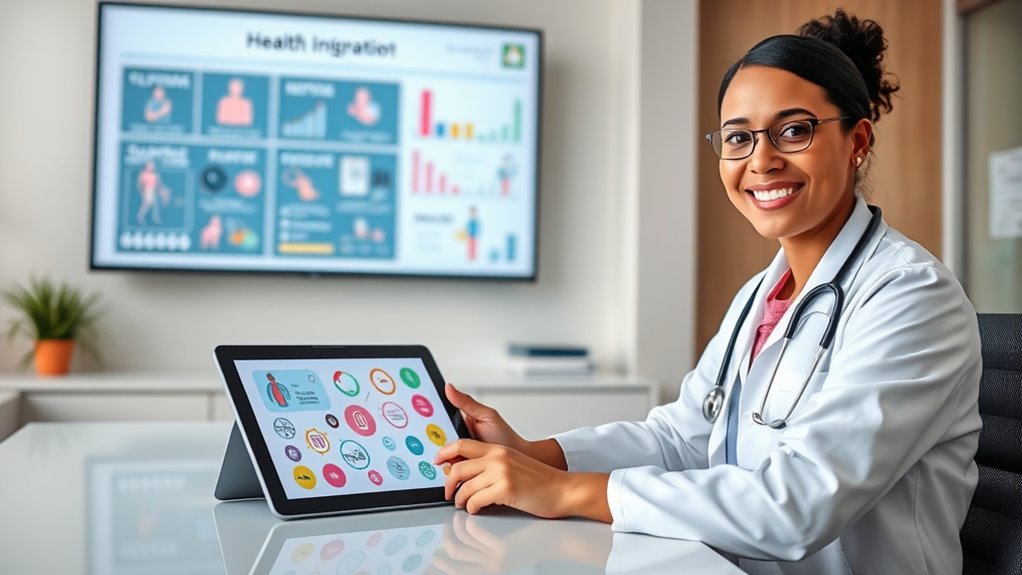Large Language Models (LLMs) are transforming healthcare by making complex health information easier for you to understand. They interpret vast medical data into clear, simple language, helping you grasp diagnoses, medications, and lifestyle advice without jargon. LLMs focus on accuracy and trustworthiness, providing real-time support tailored to your needs. They work alongside healthcare providers to enhance communication and empower you in managing your health. Keep exploring to discover how these tools can truly improve your health literacy.
Key Takeaways
- LLMs translate complex medical language into simple, understandable explanations tailored to patient literacy levels.
- They provide real-time, personalized responses to health questions, enhancing patient engagement and knowledge.
- LLMs ensure medical accuracy by referencing current, evidence-based information, reducing misinformation risks.
- They support better communication between patients and healthcare providers by clarifying diagnoses and treatment options.
- LLMs serve as accessible, on-demand tools to help patients make informed health decisions and understand their conditions.

Large language models (LLMs) are revolutionizing the way health information is delivered, making complex medical details more accessible for patients. These advanced AI tools can interpret vast amounts of medical data and translate it into clear, understandable language. As a patient, you no longer need to sift through confusing jargon or dense medical articles—LLMs can help bridge the gap between medical professionals and your understanding of your health. They are designed to prioritize medical accuracy, ensuring that the information you receive is reliable and based on current medical knowledge. This focus on accuracy is vital because misinformation or misunderstandings can have serious consequences for your health decisions. With LLMs, healthcare providers can generate explanations that are both trustworthy and tailored to your level of health literacy, making it easier for you to grasp important concepts about your condition, treatment options, and preventive measures.
Patient comprehension is a key goal of these models. When health information is simplified without losing its core meaning, you’re more likely to comprehend your diagnosis, medication instructions, or lifestyle recommendations. This improved understanding empowers you to participate actively in your healthcare, ask informed questions, and follow prescribed treatments correctly. LLMs can customize explanations based on your background, language preferences, or specific concerns, making the communication more personalized and effective. Instead of feeling overwhelmed by medical terminology, you’ll receive clear, straightforward summaries that help you retain essential details. This clarity reduces anxiety and builds confidence in managing your health. Additionally, understanding child development principles helps ensure that health guidance is appropriate for your age and developmental stage, promoting better long-term health habits.
Furthermore, LLMs can serve as real-time resources, providing instant answers to your health-related questions. Whether you’re curious about side effects, lifestyle adjustments, or preventive care, these models can generate immediate, accurate responses that are easy to understand. This instant access helps you stay informed and make timely decisions. However, it’s important to remember that while LLMs greatly enhance the delivery of health information, they should complement, not replace, professional medical advice. Healthcare providers remain your primary source for diagnosis and treatment, but LLMs serve as valuable tools to clarify and reinforce your understanding.
Frequently Asked Questions
How Do LLMS Ensure Patient Data Privacy?
You can trust that LLMs protect your data by using data encryption, which secures your information from unauthorized access. They also prioritize user consent, ensuring you’re aware of how your data is used and giving you control over it. By combining these measures, LLMs help keep your health information private while still providing helpful, simplified medical advice tailored to your needs.
Can LLMS Replace Healthcare Professionals Entirely?
No, LLMs can’t replace healthcare professionals entirely because of medical ethics and liability concerns. While they assist by providing information, they lack the empathy, judgment, and ethical decision-making essential in patient care. You should see them as tools that support, not substitute, your healthcare providers. Relying solely on LLMs risks ethical violations and accountability issues, so human oversight remains critical in medical practice.
How Accurate Are LLMS in Diagnosing Health Issues?
They say “trust, but verify,” and that’s true for LLMs in diagnosing health issues. While they can provide helpful insights, their medical accuracy and diagnostic reliability aren’t foolproof. You shouldn’t rely solely on them, as they might miss nuances or rare conditions. Always consult a healthcare professional for proper diagnosis and treatment. LLMs are tools, not substitutes, for expert medical advice.
What Are the Limitations of Using LLMS in Healthcare?
You should be aware that using LLMs in healthcare has limitations, including ethical concerns like patient privacy and data security. Bias mitigation remains a challenge, as models may reflect existing biases, impacting fairness and accuracy. Additionally, LLMs can lack contextual understanding and clinical judgment, making them unreliable for critical decisions. Always verify information with qualified healthcare professionals and consider these limitations before relying solely on LLMs.
How Do LLMS Handle Complex Medical Terminology?
Did you know that 80% of patients find medical jargon confusing? LLMs handle complex medical terminology by breaking down technical language into simpler words, making it easier for you to understand. They use advanced algorithms to identify difficult terms and replace them with clearer explanations, effectively simplifying medical terminology. This process helps you grasp health information more confidently and makes healthcare communication more accessible.
Conclusion
By using large language models to simplify health information, you can better understand your medical conditions and treatments. Did you know that 60% of patients find complex medical language confusing? LLMs make it easier to access clear, accurate info quickly, empowering you to make informed decisions about your health. As technology advances, you’ll find it even more helpful in steering through healthcare, turning complex jargon into simple, understandable guidance every step of the way.











